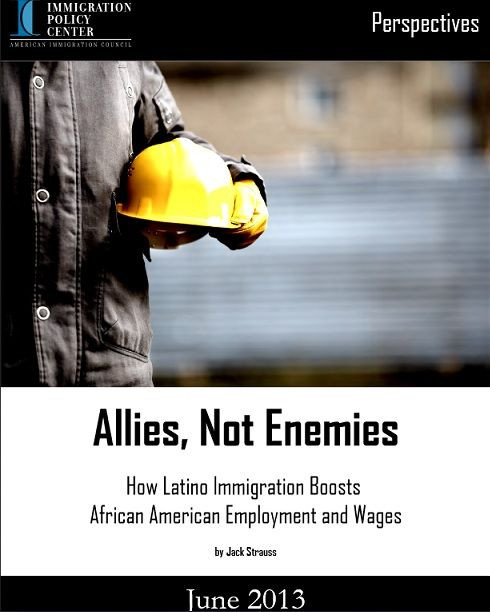
A new analysis by the Immigration Policy Center (IPC) based on census data from hundreds of US cities in 2005 and 2010 concludes that immigration from Latin America improves wages, lowers employment, and boosts job opportunities across ages and income levels for African-Americans in the United States. The IPC wrote in a summary of the analysis' conclusions that the two groups "fill complementary roles in the labor market" and added that "to the extent that there is really a 'black-brown' divide, it is rooted in politics and perception - not economics". In factoring in data from 907 metropolitan areas in 2010 and 455 in 2005, the study claimed to be the most comprehensive to date on how immigration affects African-Americans' wages and employment.
Groups which oppose legalization measures for the undocumented have in the past made use of the idea that an influx of low-skilled immigrants threatens the interests of low-skilled African-American workers in their advocacy campaigns. NumbersUSA, for example, funded a 2012 ad depicting a black family. "I mean, do our leaders really believe that black Americans don't want to work?" the ad asks.
Another such group, the Black American Leadership Alliance, has planned a march against amnesty for undocumented immigrants on July 15th in Washington, D.C. Representatives from the Alliance could not be reached late Friday afternoon for comment.
RELATED: Immigration Arrests To Be Made By Local Police? House Hearing Held On GOP Bill
The IPC's analysis acknowledges media and scholarly attention to tensions between the two communities in American cities, arising from the perception that Latino immigrants perform many of the same jobs as black Americans and for less compensation, putting the interests of the two groups at odds. But the analysis dismisses it as a matter of perception, pointing to evidence that cities with greater immigration from Latin America experience - across age groups - higher wages for African-Americans; lower shares of African-Americans in poverty and greater shares of them who have incomes exceeding $60,000; less African-American poverty; lower African-American unemployment; and more jobs.
"In addition, cities which have suffered the effects of declining population are rejuvenated by an inflow of Latino immigrants who increase the labor force, tax base, consumer base, etc." writes the study's author, Jack Strauss, adding that reason for positive economic impact is increased population.
RELATED: Immigration Reform Won't Include Protections For Same-Sex Marriages, Says Rubio, Or He's Out
"Many metros, particularly in the Midwest, including Cleveland, Dayton, Detroit, and St. Louis, are not experiencing vibrant population growth...Our research shows that an increase in immigration from Latin America would have sustained St. Louis's population, tax base, school enrollment, and most of the lost African American jobs. Further, it would have reduced crime among young African American men by giving them more economic opportunities."
RELATED: Senate Rejects Grassley Border Security Amendment
Strauss said they controlled for "simultaneity" - a statistical term which refers to confusion over the cause and effect of statistical evidence - in part by measuring their results against those of domestic migration of native-born Americans from other states as well as other demographic and educational control variables.
© 2025 Latin Times. All rights reserved. Do not reproduce without permission.




